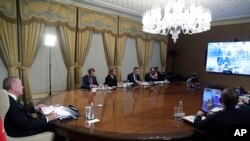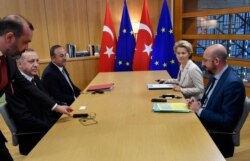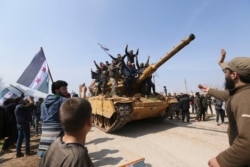Turkish, French, German and British leaders met by videoconference Tuesday to commit themselves to joint actions on the Syrian refugee crisis and coronavirus pandemic.
The last-minute conference due to the COVID-19 outbreak replaced an Istanbul summit between Turkish President Recep Tayyip Erdogan, French President Emmanuel Macron, German Chancellor Angela Merkel and British Prime Minister Boris Johnson.
"We have the opportunity to undertake comprehensive assessments on many issues up, from EU-Turkey relations to the asylum issues," tweeted Erdogan after the meeting.
Few details on the nature of the cooperation agreed between the leaders have been released.
The video summit is in response to Erdogan sparking a crisis by opening Turkish frontiers with European Union members to migrants and refugees living in Turkey. Turkey hosts nearly 4 million Syrians and Erdogan insists his country can no longer cope.
In 2015, Ankara made a similar move, resulting in more than one million people fleeing to neighboring Greece and Bulgaria, sparking a refugee crisis across Europe.
The exodus spurred the EU’s agreement on a 2016 migration deal with Turkey. Ankara then secured its borders, markedly curtailing migrants entering Europe.
The threat of a new refugee exodus into Europe is widely seen as Erdogan's most important leverage over the European leaders.
"In the past, Europe panicked, especially Germany, with the threat of Turkey opening its borders to refugees, and they tried to appease Turkey," said analyst Atilla Yesilada of Global Source Partners.
However, both Greece and Bulgaria, strongly backed by Brussels, robustly resisted the latest mass movement of migrants into their countries, following Erdogan opening Turkey's borders.
Erdogan described Greek border forces’ tactics as "Nazi-like." On Tuesday, New York-based Human Rights Watch also condemned Greek methods employed to stop migrants from entering Greece.
"The European Union is hiding behind a shield of Greek security force abuse instead of helping Greece protect asylum-seekers and relocate them safely throughout the EU," said Nadia Hardman, a refugee rights researcher of Human Rights Watch. "The EU should protect people in need rather than support forces who beat, rob, strip and dump asylum-seekers and migrants back across the river."
While drawing international condemnation, Athens' success in securing its borders and restricting the numbers of migrants entering Greece appear to have weakened Ankara's leverage over Brussels.
"Turkish President Erdogan was threatening all these years to release these refugees to the EU, and finally he did. But it was a fiasco," said political scientist Cengiz Aktar of the University of Athens. “He used his trump card in his hand, and it failed. The Greeks reacted, the EU reacted, and at the end of the day, has shown a firm stance towards Erdogan."
Earlier this month, Erdogan left Brussels empty-handed after meeting with Ursula von der Leyen, president of the European Commission, and Charles Michel, president of the European Council.
Erdogan is pressing the EU to not only pay out what he claims is an outstanding 3 billion euros owed from the 2016 migrant deal, but also further funding going forward. With a slowing economy, compounded by escalating costs of the coronavirus, analysts say Ankara is in urgent need of funds.
With reports of migrants ending their bid to enter EU countries and returning to Turkish cities, Brussels is predicted to provide further funding.
"The tension is dying down. We understand there are less and less people at the [Greek] border," said Aktar. "Following [Tuesday’s] video meeting, the EU might come up with funding, but not now. Maybe further down the road, with 1 or 2 billion [euros] later this year."
Analysts suggest Erdogan's main priority is to avert a new wave of Syrian refugees. Damascus forces are threatening to overrun Idlib, the last rebel-controlled province.
A tentative cease-fire was hammered out between Erdogan and Russian President Vladimir Putin earlier this month. But the deal is widely seen as only offering a temporary respite for the estimated 4 million people trapped in Idlib.
"Cease-fires with Russian guarantees have not been cease-fires," U.S. Ambassador to Turkey David Satterfield said in a telephone briefing in March. "They were temporary, transactional halts until Russia was prepared to renew the campaign."
Erdogan is using the cease-fire to build support from critical European NATO members for his proposal of a haven in Idlib.
In a gesture to Ankara, Merkel has voiced support that a haven preventing a new refugee exodus is of critical importance to Erdogan.
"If they [the Syrian refugees] can't go back, they'll move on to Turkey, exacerbating AKP's problems with voters," Yesilada said. “Survey after survey reveals that the Turks blame Syrian refugees for unemployment and social frictions."
Analysts point out that there is little appetite among NATO members to confront Russian forces based in Syria. But with Europe and Ankara increasingly focused on addressing the coronavirus crisis, analysts predict all sides will be perceptive to a compromise over the refugee crisis, especially given the dangers such vulnerable people face by the pandemic.
"The pandemic is an absolute priority for everyone. This additional 1 or 2 billion euros the EU might give could well be directed towards helping Turkey for its refugees within the framework of the fight against the pandemic."







